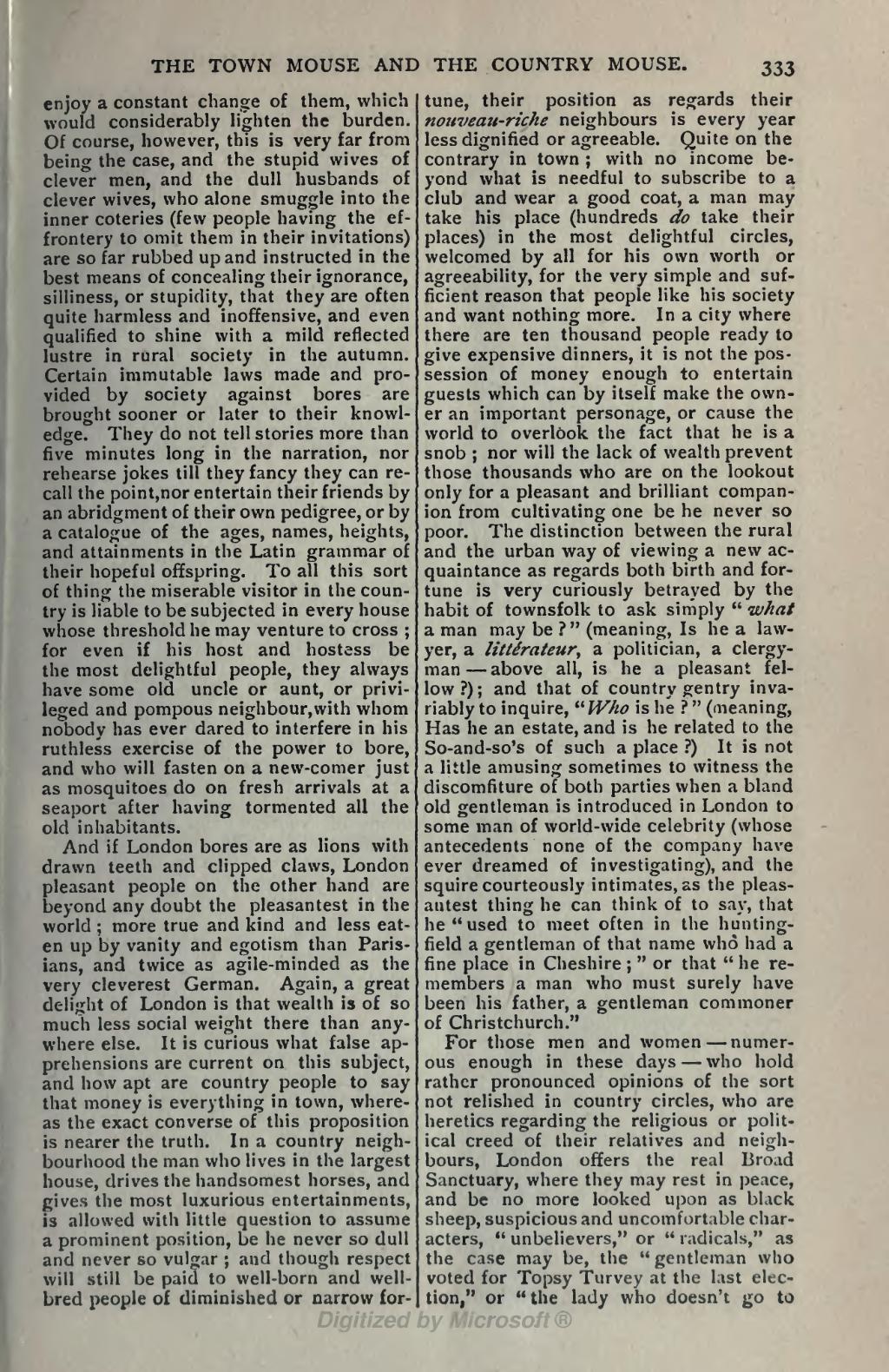enjoy a constant change of them, which would considerably lighten the burden. Of course, however, this is very far from being the case, and the stupid wives of clever men, and the dull husbands of clever wives, who alone smuggle into the inner coteries (few people having the effrontery to omit them in their invitations) are so far rubbed up and instructed in the best means of concealing their ignorance, silliness, or stupidity, that they are often quite harmless and inoffensive, and even qualified to shine with a mild reflected lustre in rural society in the autumn. Certain immutable laws made and provided by society against bores are brought sooner or later to their knowledge. They do not tell stories more than five minutes long in the narration, nor rehearse jokes till they fancy they can recall the point, nor entertain their friends by an abridgment of their own pedigree, or by a catalogue of the ages, names, heights, and attainments in the Latin grammar of their hopeful offspring. To all this sort of thing the miserable visitor in the country is liable to be subjected in every house whose threshold he may venture to cross; for even if his host and hostess be the most delightful people, they always have some old uncle or aunt, or privileged and pompous neighbour, with whom nobody has ever dared to interfere in his ruthless exercise of the power to bore, and who will fasten on a new-comer just as mosquitoes do on fresh arrivals at a seaport after having tormented all the old inhabitants.
And if London bores are as lions with drawn teeth and clipped claws, London pleasant people on the other hand are beyond any doubt the pleasantest in the world; more true and kind and less eaten up by vanity and egotism than Parisians, and twice as agile-minded as the very cleverest German. Again, a great delight of London is that wealth is of so much less social weight there than anywhere else. It is curious what false apprehensions are current on this subject, and how apt are country people to say that money is everything in town, whereas the exact converse of this proposition is nearer the truth. In a country neighbourhood the man who lives in the largest house, drives the handsomest horses, and gives the most luxurious entertainments, is allowed with little question to assume a prominent position, be he never so dull and never so vulgar; and though respect will still be paid to well-born and well-bred people of diminished or narrow fortune, their position as regards their nouveau-riche neighbours is every year less dignified or agreeable. Quite on the contrary in town; with no income beyond what is needful to subscribe to a club and wear a good coat, a man may take his place (hundreds do take their places) in the most delightful circles, welcomed by all for his own worth or agreeability, for the very simple and sufficient reason that people like his society and want nothing more. In a city where there are ten thousand people ready to give expensive dinners, it is not the possession of money enough to entertain guests which can by itself make the owner an important personage, or cause the world to overlook the fact that he is a snob; nor will the lack of wealth prevent those thousands who are on the lookout only for a pleasant and brilliant companion from cultivating one be he never so poor. The distinction between the rural and the urban way of viewing a new acquaintance as regards both birth and fortune is very curiously betrayed by the habit of townsfolk to ask simply "what a man may be?" (meaning, Is he a lawyer, a littérateur, a politician, a clergyman — above all, is he a pleasant fellow?); and that of country gentry invariably to inquire, "Who is he?" (meaning, Has he an estate, and is he related to the So-and-so's of such a place?) It is not a little amusing sometimes to witness the discomfiture of both parties when a bland old gentleman is introduced in London to some man of world-wide celebrity (whose antecedents none of the company have ever dreamed of investigating), and the squire courteously intimates, as the pleasantest thing he can think of to say, that he "used to meet often in the hunting-field a gentleman of that name who had a fine place in Cheshire;" or that "he remembers a man who must surely have been his father, a gentleman commoner of Christchurch."
For those men and women — numerous enough in these days — who hold rather pronounced opinions of the sort not relished in country circles, who are heretics regarding the religious or political creed of their relatives and neighbours, London offers the real Broad Sanctuary, where they may rest in peace, and be no more looked upon as black sheep, suspicious and uncomfortable characters, "unbelievers," or "radicals," as the case may be, the "gentleman who voted for Topsy Turvey at the last election," or "the lady who doesn't go to
